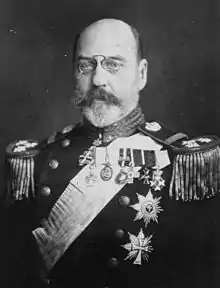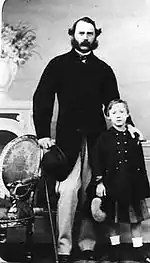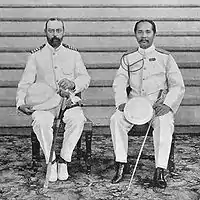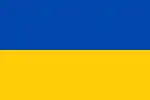| Prince Valdemar | |
|---|---|
 Portrait of Prince Valdemar, 1936 | |
| Born | 27 October 1858 Bernstorff Palace, Gentofte |
| Died | 14 January 1939 (aged 80) The Yellow Palace, Copenhagen |
| Burial | |
| Spouse | |
| Issue | |
| House | Glücksburg |
| Father | Christian IX of Denmark |
| Mother | Louise of Hesse-Kassel |
| Military career | |
| Allegiance | |
| Service/ | |
Prince Valdemar of Denmark (27 October 1858 – 14 January 1939) was a member of the Danish royal family. He was the third son and youngest child of Christian IX of Denmark and Louise of Hesse-Kassel. He had a lifelong naval career.
Early life

Prince Valdemar was born on 27 October 1858 at Bernstorff Palace in Gentofte north of Copenhagen.[1] His father was Prince Christian of Denmark, later King Christian IX. His mother was Princess Louise of Hesse-Kassel. He was baptised on 21 December 1858. He had five older siblings: Prince Frederick (1843–1912), Princess Alexandra (1844–1925), Prince William (1845–1913), Princess Dagmar (1847–1928), and Princess Thyra (1853–1933).
Prince Valdemar grew up in an increasingly international family. Despite the fact that the family had limited resources available and lived a relatively bourgeois life by royal standards, Valdemar's siblings managed to enter into some dynastically important marriages. In March 1863, the Danish royal family, including four-year-old Valdemar, travelled to London for the wedding of his eldest sister, Princess Alexandra, to the Prince of Wales, the son and heir-apparent of Queen Victoria. In June of the same year, Prince Valdemar's older brother Prince William was installed as King of Greece under the name of George I. And in November of the same year, his father succeeded to the throne of Denmark as King Christian IX following the death of King Frederick VII.
Prince Valdemar received his early education from tutors. In the summer of 1874, he accompanied his father during his visit to Iceland for the millennium celebrations. After his confirmation in 1874, as was customary for princes at that time, he started a military education and entered the naval college. In 1879, he was sub-lieutenant and in 1880 lieutenant. In the following years, he participated in several naval expeditions. Valdemar was homosexual,[2] and from 1883 lived at Bernstorff Palace near Copenhagen with his nephew Prince George of Greece, who'd been taken as a boy to Denmark to be enlisted in the Danish royal navy, and be consigned to the care of Valdemar, who was an admiral in the Danish fleet. Feeling abandoned by his father on this occasion, George would later describe to his fiancée the profound attachment he developed for his uncle from that day forward.[3]
Marriage

He married Princess Marie d'Orleans on 20 October 1885 in a civil ceremony in Paris.[4] They had a religious ceremony on 22 October 1885 at the Château d'Eu, the residence of Prince Philippe, Count of Paris.[4] The wedding was believed by one source to have been politically arranged, and in France, it was believed that the Count of Paris (the bride's uncle) was personally responsible for the match.[4] However, the same source claimed that "there was every reason to believe that [it was] a genuine love match".[4] At the time of their marriage, it was decided that any sons would be brought up in Valdemar's Lutheran faith, while any daughters would be raised as Catholics, the faith of their mother.[5] The couple's four sons were consequently Lutherans, while their only daughter, Margaret was raised a Catholic and married a Catholic prince.[5] In 1886, after the abdication of Alexander of Battenberg following a coup, the Bulgarian throne was offered to Prince Valdemar, but he and Marie agreed to refuse.
Later life

Valdemar had a lifelong naval career. He was the first president of the Seamen's Association of 1856.
He died on 14 January 1939 in the Yellow Palace in Copenhagen and was buried in Roskilde Cathedral. He was the last surviving child of Christian IX.
.svg.png.webp)
Honours
- Danish orders and decorations[6]
- Knight of the Elephant, 15 November 1863
- Cross of Honour of the Order of the Dannebrog, 15 November 1863
- Grand Commander of the Dannebrog, 21 July 1900
- King Christian IX and Queen Louise of Denmark Golden Wedding Commemorative Medal
- King Christian IX Centenary Medal
- Navy Long Service Medal
- Danish Red Cross Badge of Honor
- Commemoration Medal for Danish Prisoners-of-war for the Red Cross
- Foreign orders and decorations[6]
.svg.png.webp) Austria-Hungary: Grand Cross of the Royal Hungarian Order of St. Stephen, 1888[7]
Austria-Hungary: Grand Cross of the Royal Hungarian Order of St. Stephen, 1888[7].svg.png.webp) Belgium: Grand Cordon of the Order of Leopold, 22 July 1897[8]
Belgium: Grand Cordon of the Order of Leopold, 22 July 1897[8] Principality of Bulgaria: Grand Cross of St. Alexander
Principality of Bulgaria: Grand Cross of St. Alexander.svg.png.webp) France: Grand Cross of the Legion of Honour
France: Grand Cross of the Legion of Honour.svg.png.webp) Kingdom of Greece: Grand Cross of the Redeemer
Kingdom of Greece: Grand Cross of the Redeemer_crowned.svg.png.webp) Kingdom of Italy: Knight of the Annunciation, 23 September 1891[9]
Kingdom of Italy: Knight of the Annunciation, 23 September 1891[9].svg.png.webp) Empire of Japan: Grand Cordon of the Order of the Chrysanthemum, 26 February 1900[10]
Empire of Japan: Grand Cordon of the Order of the Chrysanthemum, 26 February 1900[10] Luxembourg: Knight of the Gold Lion of Nassau
Luxembourg: Knight of the Gold Lion of Nassau Netherlands: Grand Cross of the Netherlands Lion
Netherlands: Grand Cross of the Netherlands Lion Norway: Grand Cross of St. Olav, with Collar, 6 October 1906[11]
Norway: Grand Cross of St. Olav, with Collar, 6 October 1906[11].svg.png.webp) Ottoman Empire: Order of Osmanieh, 1st Class in Brilliants
Ottoman Empire: Order of Osmanieh, 1st Class in Brilliants.svg.png.webp) Kingdom of Portugal: Grand Cross of the Tower and Sword
Kingdom of Portugal: Grand Cross of the Tower and Sword Russian Empire:
Russian Empire:
- Knight of St. Andrew
- Knight of St. Alexander Nevsky
- Knight of the White Eagle
- Knight of St. Anna, 1st Class
- Knight of St. Stanislaus, 1st Class
- Knight of St. Vladimir, 4th Class
.svg.png.webp) Siam:
Siam:
.svg.png.webp) Sweden: Knight of the Seraphim, with Collar, 27 May 1875[12]
Sweden: Knight of the Seraphim, with Collar, 27 May 1875[12] United Kingdom: Honorary Grand Cross of the Bath (civil), 17 September 1901 – during a visit to Denmark by King Edward VII and Queen Alexandra[13]
United Kingdom: Honorary Grand Cross of the Bath (civil), 17 September 1901 – during a visit to Denmark by King Edward VII and Queen Alexandra[13].svg.png.webp) Kingdom of Prussia:
Kingdom of Prussia:
- Knight of the Black Eagle
- Grand Cross of the Red Eagle
- Knight of the Royal Crown Order, 1st Class
 Anhalt: Grand Cross of the Order of Albert the Bear
Anhalt: Grand Cross of the Order of Albert the Bear.svg.png.webp) Baden:[14]
Baden:[14]
- Knight of the House Order of Fidelity, 1888
- Knight of the Order of Berthold the First, 1888
 Brunswick: Grand Cross of the Order of Henry the Lion
Brunswick: Grand Cross of the Order of Henry the Lion.svg.png.webp)
.svg.png.webp)
.svg.png.webp) Ernestine duchies: Grand Cross of the Saxe-Ernestine House Order
Ernestine duchies: Grand Cross of the Saxe-Ernestine House Order Mecklenburg: Grand Cross of the Wendish Crown, with Crown in Ore
Mecklenburg: Grand Cross of the Wendish Crown, with Crown in Ore
Issue
| Name | Birth | Death | Spouse | Children |
|---|---|---|---|---|
| Prince Aage of Denmark | 10 June 1887 | 19 February 1940 | Mathilde Calvi | Count Valdemar of Rosenborg |
| Prince Axel of Denmark | 12 August 1888 | 14 July 1964 | Princess Margaretha of Sweden | Prince Georg of Denmark Count Flemming of Rosenborg |
| Prince Erik of Denmark | 8 November 1890 | 10 September 1950 | Lois Booth | Countess Alexandra of Rosenborg Count Christian of Rosenborg |
| Prince Viggo of Denmark | 25 December 1893 | 4 January 1970 | Eleanor Margaret Green | No children |
| Princess Margaret of Denmark | 17 September 1895 | 18 September 1992 | Prince René of Bourbon-Parma | Prince Jacques of Bourbon-Parma Queen Anne of Romania Prince Michel of Bourbon-Parma Prince André of Bourbon-Parma |
Ancestry
References
Citations
- ↑ Montgomery-Massingberd, Hugh (1977). Burke's Royal Families of the World. Vol. 1. London: Burke's Peerage. ISBN 0-220-66222-3., p. 69.
- ↑ Élisabeth Roudinesco, Freud: In His Time and Ours, Harvard University Press, 2016, p310
- ↑ Bertin, Celia (1982). "A False Happiness". Marie Bonaparte: A Life. New York: Harcourt Brace Jovanovich. pp. 85–86. ISBN 0-15-157252-6.
From that day, from that moment on, I loved him and I have never had any other friend but him...You will love him too, when you meet him.
- 1 2 3 4 "Royal Marriage Bells", The New York Times, Eu, France, 22 October 1885
- 1 2 Finestone, p. 199.
- 1 2 Bille-Hansen, A. C.; Holck, Harald, eds. (1933) [1st pub.:1801]. Statshaandbog for Kongeriget Danmark for Aaret 1933 [State Manual of the Kingdom of Denmark for the Year 1933] (PDF). Kongelig Dansk Hof- og Statskalender (in Danish). Copenhagen: J.H. Schultz A.-S. Universitetsbogtrykkeri. pp. 15, 18. Retrieved 24 December 2019 – via da:DIS Danmark.
- ↑ "A Szent István Rend tagjai" Archived 22 December 2010 at the Wayback Machine
- ↑ Royal Decree of 22 July 1897
- ↑ Italia : Ministero dell'interno (1898). Calendario generale del Regno d'Italia. Unione tipografico-editrice. p. 54.
- ↑ 刑部芳則 (2017). 明治時代の勲章外交儀礼 (PDF) (in Japanese). 明治聖徳記念学会紀要. p. 149.
- ↑ Norway (1908), "Den kongelige norske Sanct Olavs Orden", Norges Statskalender (in Norwegian), p. 869-870, retrieved 17 September 2021
- ↑ Sveriges statskalender (in Swedish), 1905, p. 440, retrieved 2018-01-06 – via runeberg.org
- ↑ "No. 27356". The London Gazette. 17 September 1901. p. 6101.
- ↑ Hof- und Staats-Handbuch des Großherzogtum Baden (1896), "Großherzogliche Orden" pp. 63, 77
Bibliography
- Bramsen, Bo (1992). Huset Glücksborg. Europas svigerfader og hans efterslægt [The House of Glücksburg. The Father-in-law of Europe and his descendants] (in Danish) (2nd ed.). Copenhagen: Forlaget Forum. ISBN 87-553-1843-6.
- Finestone, Jeffrey (1981). The Last Courts of Europe: A Royal Family Album 1860-1914. London: J. M. Dent and Sons Ltd. ISBN 0-517-41472-4.
- Lerche, Anna; Mandal, Marcus (2003). A royal family : the story of Christian IX and his European descendants. Copenhagen: Aschehoug. ISBN 9788715109577.
- Thorsøe, Alexander (1904). "Valdemar, Prins". In Bricka, Carl Frederik (ed.). Dansk Biografisk Lexikon, tillige omfattende Norge for Tidsrummet 1537-1814 (in Danish). Vol. XVIII (1st ed.). Copenhagen: Gyldendal. pp. 188–189.
External links
- Prince Valdemar at the website of the Royal Danish Collection at Amalienborg Palace
